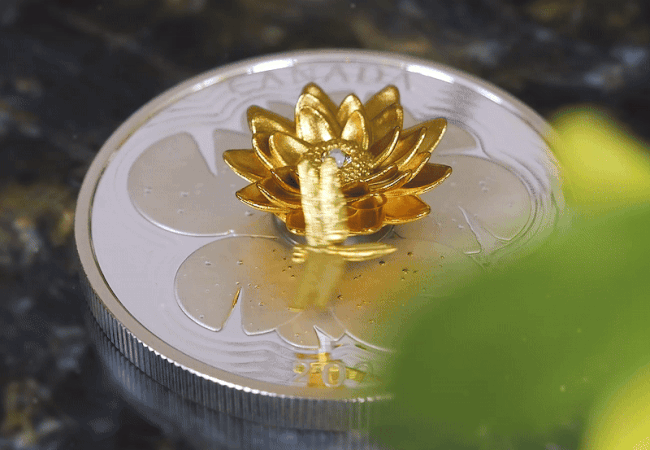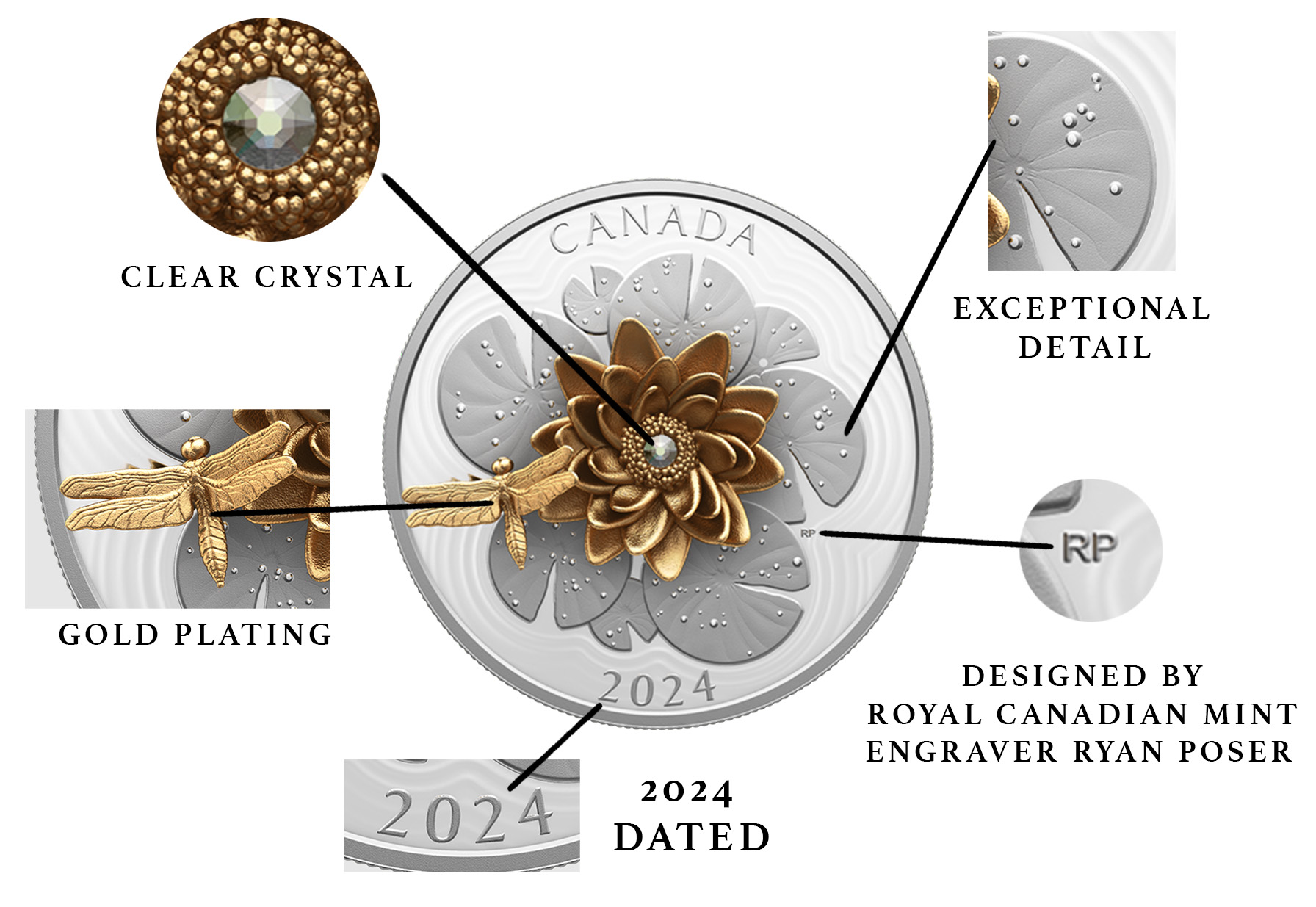Information
Artwork by Renowned Aviation artist Tim O’Brien recommissioned for NEW Limited Edition Concorde Set

When we think of aviation legends, few aircraft capture the imagination quite like Concorde. Sleek, supersonic, and effortlessly stylish, Concorde wasn’t just a mode of transport but a marvel of engineering that changed aviation forever. Now, a new opportunity has emerged for enthusiasts and collectors alike: the chance to own FIVE Supersonic Concorde Commemoratives featuring artwork by renowned aviation artist Tim O’Brien recommissioned for this Concorde set.
Tim O’Brien’s Artistic Mastery
Aviation art enthusiasts will already be familiar with Tim O’Brien’s name. His breathtaking work has been celebrated far and wide, capturing the spirit of flight in a way few artists can. O’Brien’s pieces don’t just depict aircraft; they convey the majesty of the skies and the meticulous detail of every rivet and curve. His original Concorde watercolour, once exhibited at the prestigious Guild of Aviation Artists Exhibition at the Mall Gallery in London, quickly became a sensation, with prints selling out and becoming highly prized collectibles.

The Mall Gallery itself is known for showcasing works that can command prices of £1,000 and beyond. Yet, here’s the incredible part: today, you can own five remarkable pieces inspired by O’Brien’s Concorde originals, all for just £29.99 (+p&p).
Five Skylines, Five Legendary Moments
This limited-edition set celebrates Concorde’s iconic journeys across some of the world’s most famous cities. Each commemorative features a scene that captures Concorde in all its supersonic glory:
- London, the city that helped launch Concorde into fame.
- Paris, a partner in Concorde’s innovation and home to its impressive engineering feats.
- New York, where passengers disembarked in half the usual transatlantic flight time.
- Sydney, symbolising Concorde’s range and ambition to connect the world’s most distant points.
- Washington, another destination that witnessed the era of supersonic luxury.
The detail and quality of these pieces are nothing short of mesmerising, with each commemorative bringing to life Concorde’s beauty against stunning cityscapes.
A Legacy That Endures
Why does Concorde still captivate us? Perhaps it’s because Concorde was a technological marvel that operated ahead of its time, cruising at Mach 2.04 (more than twice the speed of sound). With a top speed of over 1,350 mph, Concorde was faster than a bullet and could fly from London to New York in under 3.5 hours. In an era before widespread internet connectivity, Concorde made global travel feel truly instantaneous.

Concorde’s first commercial flight took place on January 21, 1976, and the aircraft continued to serve for 27 years until its final flight in 2003. During that time, Concorde carried royalty, celebrities, and business leaders in an unparalleled fusion of speed and luxury. It remains the only supersonic passenger aircraft ever to have seen regular service, a feat unmatched to this day.
Affordable Fine Art for Collectors
These commemoratives aren’t just a tribute to a bygone era of supersonic luxury; they are an affordable way to own a piece of fine art history. Tim O’Brien’s work, which has been revered and collected around the world, is now within reach for aviation enthusiasts and art lovers alike. For just £29.99 (+p&p), you can secure a limited-edition set that pays homage to Concorde’s breathtaking legacy and captures the essence of O’Brien’s masterful artistry.
Secure your set today for just £29.99 (+p&p) and celebrate Concorde’s unforgettable mark on the world.
Honouring Dorothy Wilding: The Visionary Behind Queen Elizabeth II’s Iconic Portraits
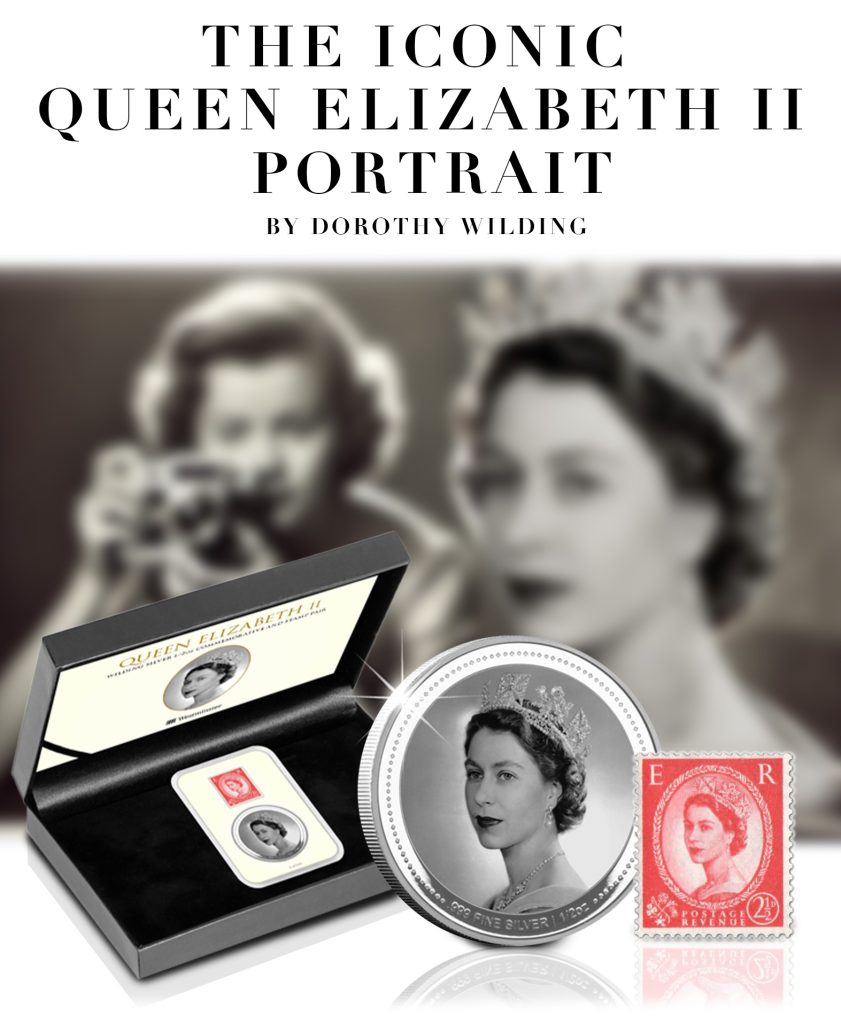

Dorothy Wilding, a name synonymous with timeless elegance and photographic mastery, played a significant role in shaping the image of one of the world’s most recognised monarchs: Queen Elizabeth II. Known for her simple yet striking photographic style, Wilding’s portraits of the Queen became the foundation for a new era of royal imagery.
In early 1952, just twenty days after Queen Elizabeth II’s accession to the throne, Wilding was granted the honour of conducting the first official photographic sitting. The Queen’s new role demanded an image that would grace coins, banknotes, and stamps, becoming a lasting symbol of her reign. Wilding, already experienced as a royal photographer, had previously captured official portraits at King George VI’s Coronation in 1937 and had been awarded the first Royal Warrant for a female photographer in 1943.
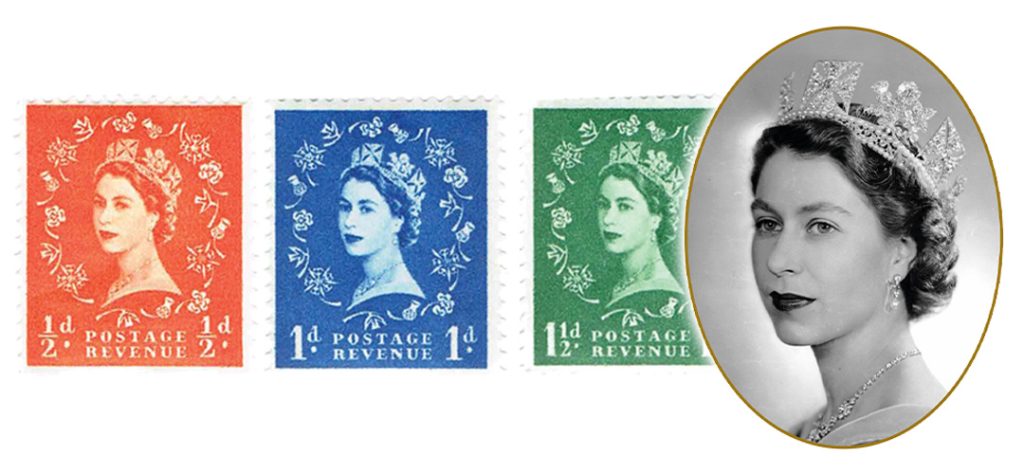
On February 26, 1952, Wilding photographed the young Queen wearing magnificent Norman Hartnell gowns and royal jewelry, such as the Diamond Diadem and the Girls of Great Britain and Ireland tiara. With an elegant simplicity, she utilized plain black and white backdrops, drawing all attention to the poise and grace of her subject. Out of the fifty-nine images taken during that session, one particular portrait became an icon. This three-quarter bust image of the Queen was selected for the 2½ pence stamp, released for the 1953 Coronation. The first stamp to depict Elizabeth II featured this portrait, and these stamps became commonly known as “Wildings.” The Queen’s head is turned slightly towards the viewer in a three-quarter profile, adding to the elegance of Wilding’s work.
For the ½d, 1d, 1½d, and 2d value stamps, the portrait was adorned with a decorative floral design created by Enid Marx. When we say a stamp has a value in “d,” this means its value in pennies. For example The notation “1½d” refers to one and a half (1.5) old pence. The “d” stands for “denarius,” a term used in pre-decimal British currency to denote pennies. Before 1971, the UK used pounds, shillings, and pence, with 12 pennies to the shilling and 20 shillings to the pound, totaling 240 pence in each pound. The currency change in the 1970s, known as decimalisation, significantly impacted stamps.
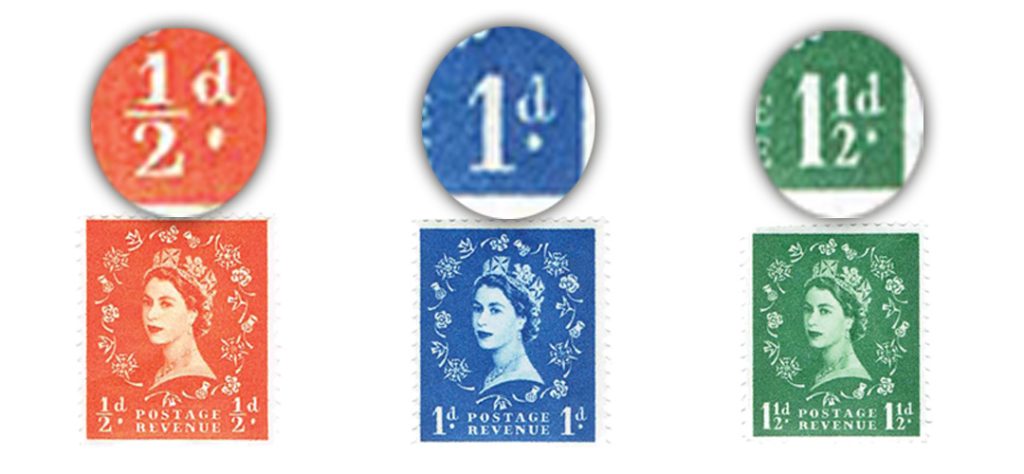
The stamps featuring this iconic portrait remained in circulation until 1971, and the photograph itself was hung in British Embassies around the world. Wilding’s work not only captured the Queen’s regal aura but also set a precedent for how the monarchy was represented on currency and official memorabilia. Her artistry continues to be celebrated and remembered as a key component of Britain’s visual heritage.
Introducing the Dorothy Wilding Silver Commemorative and Postage Stamp Set
To honour the legacy of Dorothy Wilding and her contribution to royal history, we are excited to present the First Dorothy Wilding Silver Commemorative and original postage stamp set. This exclusive offering celebrates the artistry of Wilding and the iconic image of Queen Elizabeth II that shaped an era.
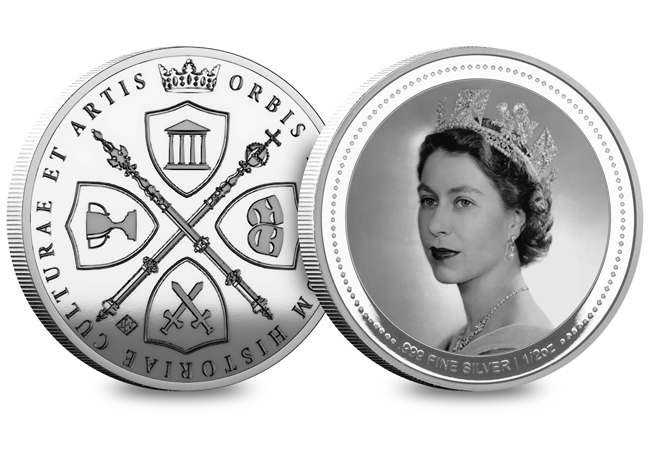
This set features a beautifully designed half-ounce pure silver commemorative, adorned with an officially licensed portrait of Queen Elizabeth II by Dorothy Wilding. The striking image is courtesy of the National Portrait Gallery, London, and reflects the timeless elegance that made Wilding’s photographs so celebrated. The commemorative captures the Queen’s grace and the iconic simplicity of Wilding’s style, making it a collector’s treasure.
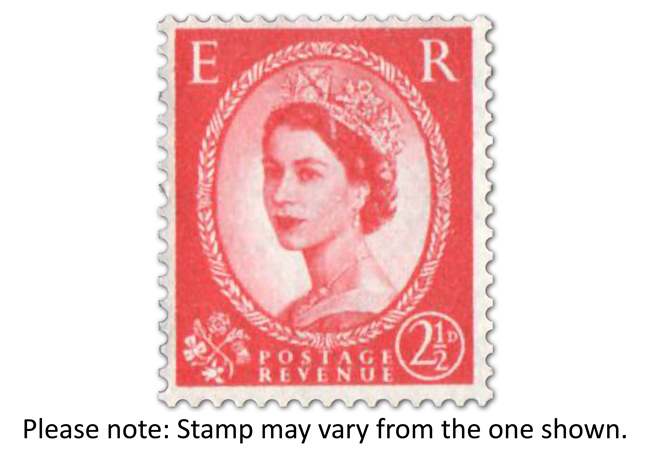
Accompanying the commemorative is an authentic Dorothy Wilding postage stamp, carefully selected from the 1952–1968 period. These stamps, available in vibrant colours and various denominations, offer a glimpse into the era when Wilding’s portraits of the Queen became a part of everyday British life.

But a limited quantity of just 250 sets being released this year, you will need to be quick to secure yours before they are all gone.
This exclusive collectible not only commemorates the artistry of Wilding but also celebrates the enduring legacy of Queen Elizabeth II. Each set includes a Certificate of Authenticity, affirming its place in history and the prestige of owning such a meaningful piece of royal heritage.
The Dragonfly and the Bloom Fine Silver Proof Coin: A Touch of Magic
Imagine capturing the beauty of a dragonfly hovering over a bloom on a sunny day. The Dragonfly and the Bloom Fine Silver Proof Coin brings this enchanting scene to life with an interactive design that lets you experience nature’s elegance every time you hold it.
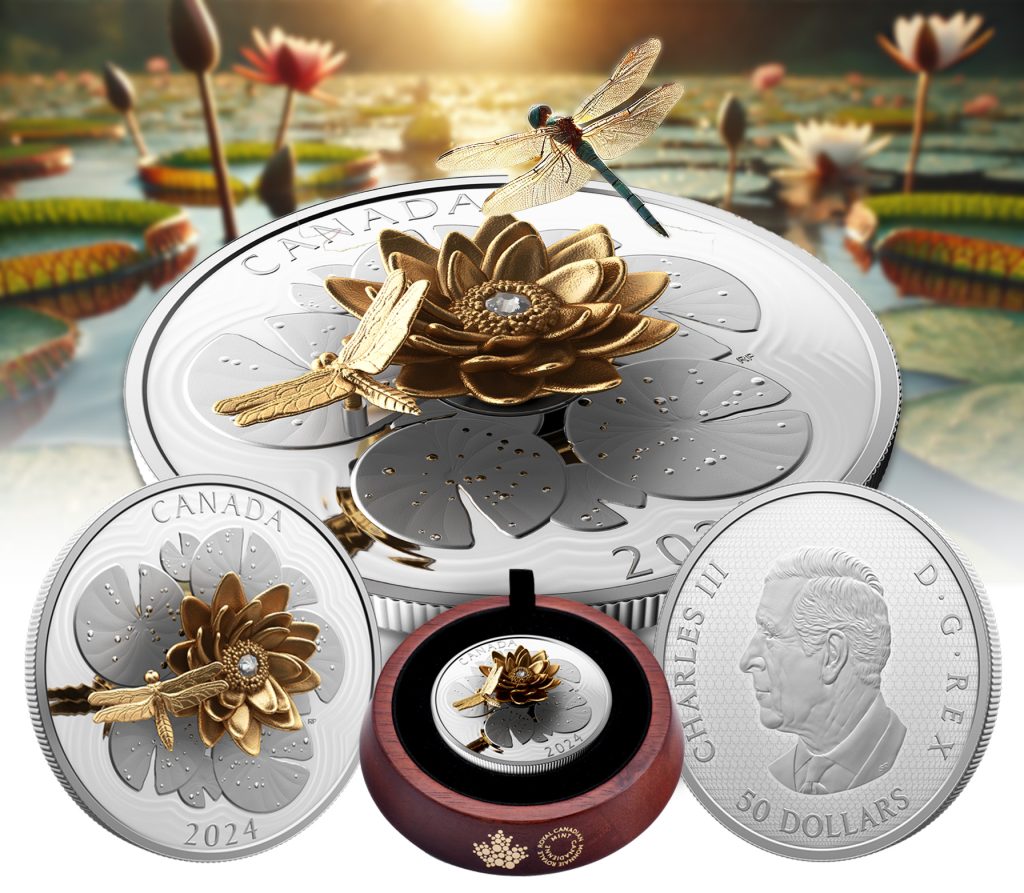
A Coin That Moves With You
This 2024 movement coin features a gyroscopic design—tilt the coin, and the dragonfly circles around the golden bloom! Crafted from sterling silver and plated in yellow gold, the dragonfly and bloom are meticulously detailed to evoke sunlit warmth. The bloom’s center sparkles with a clear crystal, mimicking a dew drop glistening in sunlight.
Exceptional Realism and Golden Details
The coin’s intricate engraving draws viewers into a serene moment: ripples spread across the mirror-like “water” surface, with delicate water droplets adding depth. Both the dragonfly and bloom are cast in 3D and plated in yellow gold, but subtle variations in the finish enhance the realism. The inward curves of the flower petals soften the light, while the dragonfly’s wings and body shine brightly, catching the light in a way that beautifully contrasts with the bloom.
With 5 oz. of 99.99% pure silver and a generous 65.25mm diameter, the coin provides an expansive canvas. The backdrop depicts lily pads floating on rippling water, all polished to a beautiful proof finish. Each coin is truly a miniature work of art.
Limited and Exclusive
Only 1,250 of these coins were minted, and with the Royal Canadian Mint sold out, just 50 are available exclusively to UK collectors through Westminster. Each coin comes on a wooden base under a protective dome, accompanied by a certificate of authenticity.
Secure yours with a deposit of just £82.50 and bring a piece of magic to your collection.
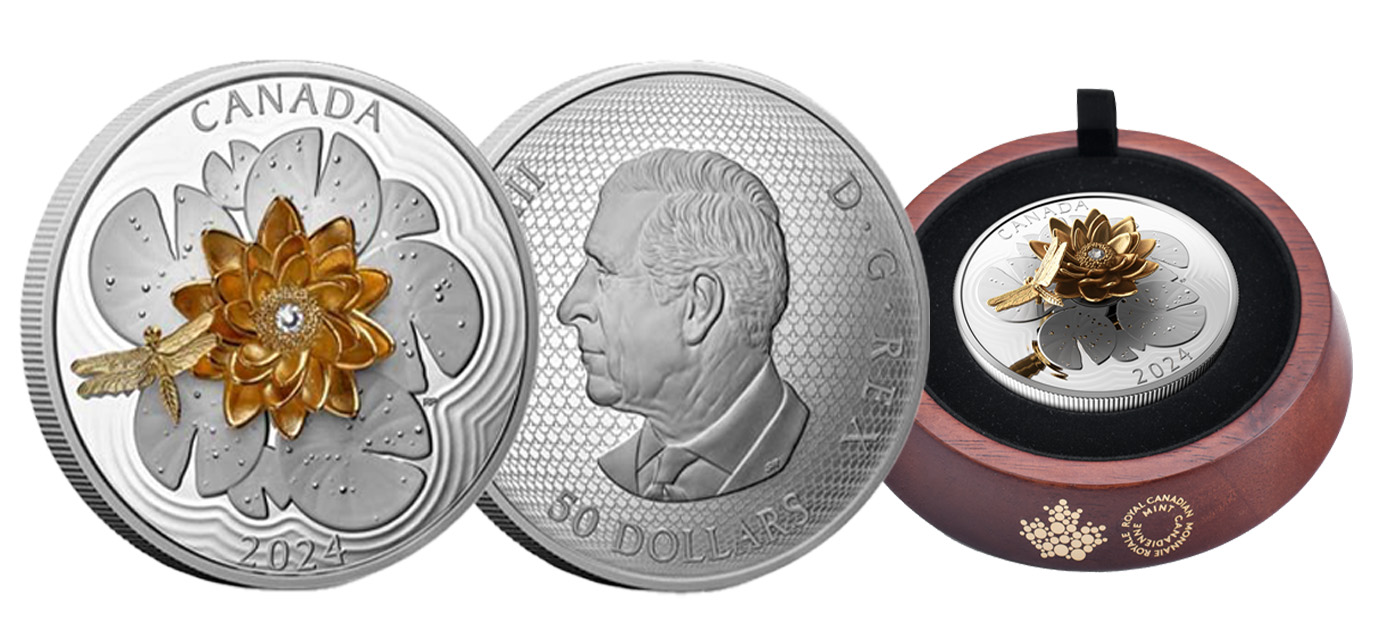
Embrace this enchanting piece and hold onto its beauty all year round!






